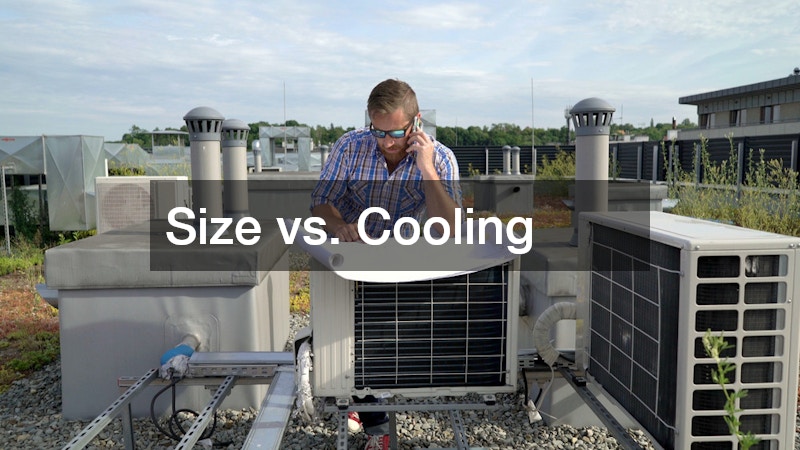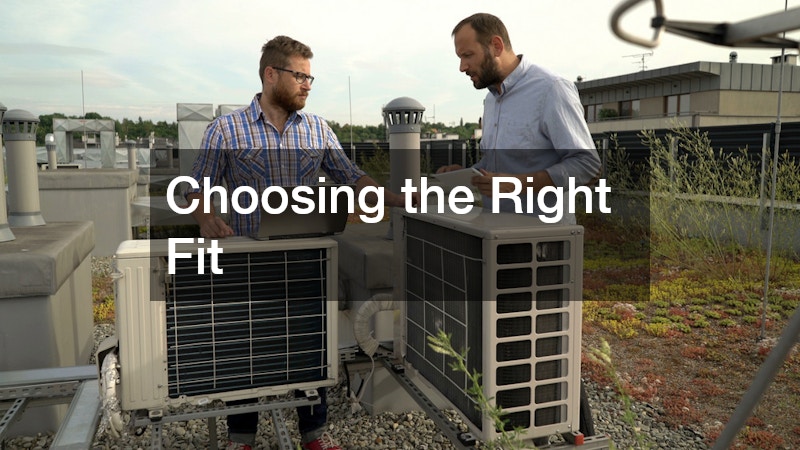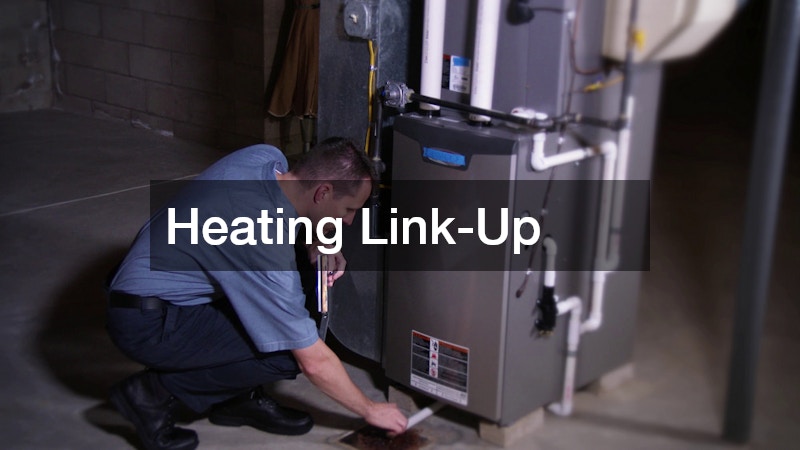When it comes to home cooling, few elements are as critical as the air conditioning compressor. This vital component plays a central role in determining how effectively and efficiently your system can manage indoor temperatures. However, many homeowners are unaware that the AC compressor size can dramatically influence both comfort and energy consumption. The correct size ensures your cooling system performs as expected, without excessive wear and tear or energy waste.
Selecting the right compressor isn’t as simple as opting for the largest or most powerful model. A system that is too large or too small for your home can lead to significant issues. An oversized unit may cool your space too quickly without properly dehumidifying the air, leading to clammy indoor conditions. On the other hand, a unit that’s too small will struggle to keep up, running continuously without ever truly reaching the desired temperature. This imbalance not only affects comfort but also shortens the system’s lifespan and increases utility bills.
In the sections that follow, we’ll break down everything you need to know about the importance of compressor size in a home cooling system. Each part of the article will explore a different aspect of this topic—from basic functionality to installation missteps and common repair needs. You’ll also learn when to seek expert help, how heating systems are tied into the equation, and what to expect from local professionals. By the end of this guide, you’ll have a solid understanding of how this one component, when properly sized, can make all the difference in keeping your home cool, comfortable, and energy-efficient.
1. Compressor Basics
At the heart of every air conditioning system lies the compressor, a mechanical component tasked with circulating refrigerant between the indoor and outdoor units. It works by compressing low-pressure gas into a high-pressure form, which is then cooled and converted back into a gas to repeat the process. This cycle is what allows your home to remain consistently cool, no matter how hot it gets outside. While it’s easy to overlook this part of the system, it serves as the primary driver of your air conditioner’s cooling ability.
When discussing AC compressor size, it’s important to understand that “size” refers to the unit’s capacity to move refrigerant and manage indoor air temperatures. This isn’t about physical dimensions, but rather the amount of heat the system can remove in a given time, often measured in tons. A properly sized compressor ensures your home is cooled evenly and efficiently, without the frequent cycling or energy waste that can occur when the size isn’t correctly matched to your needs.
If you’re unsure whether your system is properly equipped, local AC services often offer home assessments that include load calculations to determine the ideal compressor size for your property. Engaging with these local experts can be the first and most important step in optimizing your system and avoiding long-term cooling issues.
2. Size vs. Cooling

The relationship between compressor size and your home’s cooling capability is one of balance. Too small, and your system strains to keep up with demand. Too large, and it short-cycles—frequently turning on and off, which can wear out components and drive up energy costs. This balancing act is a key reason why sizing is one of the most critical steps in HVAC planning and installation. It directly affects system longevity, performance, and overall comfort in your living space.
More specifically, a mismatched AC compressor size can contribute to uneven temperatures across your home, higher humidity levels, and longer run times. These issues are not only frustrating but also contribute to premature system failure. On a more technical level, incorrect sizing can interfere with the refrigerant cycle, leading to inefficient energy use and a reduced ability to maintain target temperatures in larger or multi-level homes.
To ensure your HVAC system performs at its best, it’s worth investing in a professional evaluation, especially when replacing an old system or making significant home modifications. Skilled technicians will assess the thermal dynamics of your home and recommend a compressor capacity that matches its unique needs. Getting this right from the start can save you both stress and money over the long term.
3. Comfort Impacts
Home comfort goes far beyond just cooling the air. It also means maintaining consistent temperatures, managing humidity levels, and ensuring quiet, efficient operation. An improperly sized compressor disrupts all of these elements. When your system can’t remove enough moisture or runs noisily due to frequent cycling, your home’s livability can suffer even if the thermostat appears to show the right number.
A unit that’s well-matched to your home will provide steady cooling without overburdening the system or failing to control humidity. For instance, oversized compressors tend to shut off too quickly to properly dehumidify, leaving the air feeling muggy and stale. On the flip side, undersized systems run constantly without delivering full comfort, increasing wear, and driving up your electricity bills.
Professionals who specialize in heating and air conditioning often stress the importance of getting the size right because they’ve seen firsthand how it affects every facet of home cooling. If your current system isn’t delivering comfort despite recent maintenance or repairs, it may be time to re-evaluate whether the compressor is properly sized for your space.
4. Choosing the Right Fit

Selecting the proper compressor size isn’t something most homeowners can or should do alone. Because the decision requires consideration of home layout, insulation, regional climate, and even your household habits, it’s crucial to partner with an experienced AC contractor. These professionals bring the technical know-how to assess your home’s needs and recommend the right size system for optimal performance.
When evaluating AC compressor size, contractors will perform a load calculation, which analyzes the unique characteristics of your space, including square footage, ceiling height, window placement, and more. The right contractor will use industry-standard methods to match your home with the perfect equipment.
A reputable AC contractor can also provide insights into future-proofing your system. For example, if you plan on building an addition or upgrading insulation, they can account for those factors to prevent the need for another upgrade in a few years. Their expertise helps ensure that your compressor will remain reliable and efficient, even as your home evolves.
5. Airflow and Balance
Proper airflow is a cornerstone of effective cooling, and it’s closely tied to compressor function. If your compressor isn’t sized correctly, the entire system can suffer. This includes issues like weak airflow, hot and cold spots in the home, and inconsistent performance. One of the most overlooked problems following a poor AC install is a misaligned airflow system, which stems from improper sizing of both the compressor and ductwork.
When the AC compressor size is too large, the system may force air into rooms too quickly, leaving uneven temperatures and wasted energy. A compressor that’s too small won’t provide enough pressure to circulate cooled air effectively, resulting in a sluggish and inefficient performance.
Getting the airflow balance right begins at installation. A qualified technician will consider both the compressor’s capacity and the layout of your duct system. During the AC install process, they will measure airflow requirements room-by-room to ensure even cooling. By doing so, they help maintain consistent comfort levels while extending the life of your compressor and lowering energy costs.
6. When to Get Help

If you’re noticing strange noises, rising utility bills, or a cooling system that just can’t keep up, it may be time to call in the experts. These are all signs that something could be wrong with your compressor, and potentially that it’s the wrong size. Fortunately, local HVAC companies are well-versed in identifying these problems quickly and recommending actionable solutions that restore comfort and efficiency.
Often, the root of poor system performance lies with a mismatch in AC compressor size. Because these issues can develop slowly over time, many homeowners don’t notice until the peak of summer hits. Local professionals can perform diagnostics to test the load against system capacity and check for airflow restrictions, refrigerant issues, or faulty thermostats.
What makes local HVAC companies particularly valuable is their familiarity with regional climate conditions and home construction trends. They understand the cooling demands typical of your area and can recommend systems that align with your specific needs. Their local knowledge helps ensure your compressor is sized and configured for long-term reliability.
7. Install Pitfalls
It’s tempting to think that a new air conditioner guarantees better performance, but that isn’t always the case. Improper AC installation, especially when it comes to sizing the compressor, can result in serious long-term issues. A misstep at this stage may lead to higher operating costs, persistent discomfort, and the need for early replacement.
One of the most common problems during installation is misjudging the AC compressor size. A rushed or inexperienced technician may focus on equipment brand or price, rather than matching the compressor to your home’s actual cooling needs. This shortcut can cost you more over time in repairs and energy bills.
To avoid these pitfalls, it’s essential to choose a company that takes AC installation seriously and follows best practices. A thorough assessment should include a complete system evaluation, duct inspection, and post-installation performance testing. Ensuring these steps are followed helps confirm that your compressor—and your entire HVAC system—will function as intended.
8. Heating Link-Up

While your AC and heating systems serve different functions, they often share components like air handlers, ductwork, and thermostats. If your cooling system isn’t performing well, the issue could relate to the heating side, especially if your system was designed for dual use. In some cases, companies that offer furnace repair services can also help assess your compressor size and ensure compatibility.
When evaluating your home’s AC compressor size, it’s critical to consider how the heating system integrates with it. For example, the blower used in your furnace is typically responsible for distributing cool air in the summer. If your blower isn’t powerful enough or doesn’t match the compressor’s capacity, airflow may be compromised. This mismatch can reduce cooling efficiency and lead to strain on the entire system.
Fortunately, professionals who handle both heating and cooling can provide a comprehensive approach. Whether you’re scheduling seasonal maintenance or troubleshooting a cooling issue, it’s worth discussing your compressor with a technician familiar with both systems.
9. Local Expertise
Homeowners often think of repairs as a last resort—but in many cases, routine service can uncover deeper issues, like an improperly sized compressor. If you’ve needed frequent AC repair in recent years, it may be time to look beyond parts and consider whether the system itself was ever properly matched to your home’s needs.
A recurring issue with incorrect AC compressor size is mechanical strain. Compressors that are too small will overwork themselves, leading to burnout. Those that are too large cycle on and off frequently, damaging internal components over time. Both scenarios increase the need for repairs and reduce your system’s life expectancy.
An experienced technician specializing in AC repair will go beyond the surface symptoms to look at systemic causes. They can measure system pressure, airflow, and run times to determine if your compressor is the right size. Their input can help you decide whether a replacement or reconfiguration would better serve your comfort and energy goals.
10. Trusted Tech Tips
Choosing the right equipment for your home isn’t just about the brand—it’s about the people behind the tools. Skilled heating and air conditioning technicians can make the difference between a system that runs smoothly for decades and one that causes constant headaches. These experts have the training to diagnose issues, recommend solutions, and install systems that deliver real, measurable comfort.
Their insights on AC compressor size are particularly valuable. Technicians understand how to perform load calculations, assess duct efficiency, and account for long-term use patterns. They also keep up with new technology and best practices, which can help you benefit from the latest energy-efficient options tailored to your space.
Working with trusted technicians means more than just a functional system. Their attention to detail ensures your compressor won’t just function, it’ll thrive. When you’re dealing with triple-digit heat, that assurance is worth every penny.
Throughout this guide, we’ve explored why compressor size is one of the most important decisions you’ll make when it comes to home cooling. While it may seem like a technical detail best left to professionals, understanding the concept empowers you to make smarter choices.
A compressor that’s too small will constantly run but never deliver true comfort. One that’s too large will shut off too quickly, leaving humidity behind and cycling itself into premature failure. These aren’t just minor inconveniences—they’re issues that affect your comfort, energy use, and equipment lifespan. Fortunately, by working with experienced professionals and understanding how sizing impacts performance, you can avoid these outcomes.
Your home should be a sanctuary from the heat, not a source of stress. That starts with equipment that’s properly sized to meet your needs. By paying attention to the details, investing in expert help, and taking AC compressor size seriously, you can enjoy cooler summers, lower bills, and a system that performs the way it’s meant.
